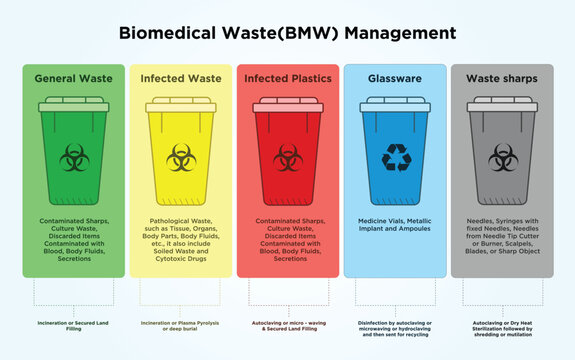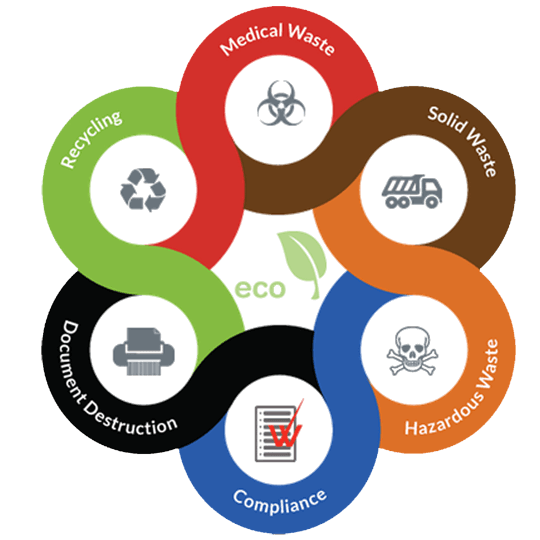Strategic Medical Waste Disposal Solutions: Promoting Safety and Sustainability
Appropriate Disposal Strategies for Medical Waste
Appropriate disposal methods for clinical waste are of utmost importance in making sure the safety and security of both healthcare employees and the public. The suitable handling and disposal of medical waste is critical to avoid the spread of contagious diseases and the contamination of the atmosphere. This includes the risk-free disposal of sharps, contagious waste, and pharmaceutical waste. Following rigorous standards established by governing bodies is important to preserve conformity with legal regulations and safeguard public health and wellness. This introduction will check out the relevance of correct clinical waste disposal, offer guidelines for handling different sorts of waste, and stress the requirement for health care centers to take on finest methods. By complying with these guidelines, healthcare suppliers can add to a much safer and healthier environment for all.
Relevance of Proper Clinical Waste Disposal
Proper clinical waste disposal is of utmost significance in order to avoid the spread of infections and protect public wellness. Medical waste describes any waste generated throughout medical treatments or from the health care market. This waste can contain contagious materials, such as blood or physical liquids, sharps, pharmaceuticals, and various other potentially unsafe compounds. If not taken care of appropriately, clinical waste can position significant risks to health care employees, clients, and the public.
One of the main factors for correct medical waste disposal is to stop the spread of infections. Clinical waste can nurture various virus, including microorganisms, infections, and other microorganisms that can create illness. Incorrect disposal can bring about the contamination of surfaces, water sources, and air, enhancing the threat of infections. By safely disposing of medical waste, the possibilities of direct exposure to these pathogens are considerably minimized, making certain the safety of healthcare workers, people, and the area at huge.
Moreover, appropriate clinical waste disposal is vital for protecting public wellness. By complying with proper disposal strategies, such as containment, partition, and therapy, we can decrease the potential dangers linked with medical waste and safeguard the wellness of the area.
Handling and Disposing of Sharps
When it concerns the handling and disposal of sharps, adherence to correct protocols is important for making sure the safety and security of medical care employees and avoiding the danger of injury or infection. Sharps consist of needles, syringes, lancets, and various other products with the possible to cut the skin or pierce. As a result of their prospective to send bloodborne microorganisms, such as HIV and liver disease B and C, it is critical to handle and dispose of sharps correctly.

Disposal of sharps containers must follow neighborhood regulations and standards. It is best to utilize licensed clinical waste disposal services that specialize in the correct handling and disposal of sharps to make certain conformity with regulations and decrease risks to medical care workers and the setting.
Standards for Infectious Garbage Disposal
Healthcare centers have to abide by stringent standards for the disposal of contagious waste to stop the spread of pathogens and shield public health. Transmittable waste, also called biomedical or biohazardous waste, describes materials that are possibly infected with infectious representatives or various other dangerous materials. These materials include blood-soaked plasters, made use of societies, samplings, and handwear covers. Appropriate disposal of transmittable waste is essential to make sure the security and wellness of medical care employees, patients, and the general public.
The guidelines for contagious waste disposal vary depending on the country and neighborhood laws, but there are some common practices that medical care centers must comply with. Firstly, all contagious waste needs to be segregated from other sorts of waste at the point of generation. This helps avoid cross-contamination and makes sure that the waste can be managed suitably. Contagious waste ought to be stored in leak-proof, puncture-resistant containers that are plainly classified with the biohazard sign. When not in use to minimize the threat of direct exposure, these containers must be maintained shut. Infectious waste must be carried and disposed of by licensed waste administration companies that specialize in taking care of biomedical waste.
It is vital for health care centers to have extensive training programs in position to educate personnel on the correct procedures for contagious garbage disposal. This includes training on waste segregation, storage, and managing methods. By following these guidelines, health care centers can properly manage infectious waste, minimize the threat of infections, and protect public health.
Finest Practices for Drug Garbage Disposal
Drug waste disposal need to always be conducted regularly and based on professional guidelines. Proper administration of pharmaceutical waste is important to shield public health and the atmosphere. Pharmaceuticals can present a considerable danger if not disposed of properly, as they may contaminate water resources, damage water life, or also add to the advancement of antibiotic resistance.
One of the most effective techniques for pharmaceutical garbage disposal is to develop an assigned collection system within health care facilities. medical waste disposal service. This system needs to consist of separate containers for different kinds of pharmaceutical waste, such as run out drugs, extra medications, and polluted materials. These containers need to be plainly classified and located in conveniently accessible locations to motivate correct disposal by healthcare specialists
Moreover, it is critical to inform medical care team about the appropriate handling and disposal of pharmaceutical waste. Training programs need to concentrate on determining various sorts of pharmaceutical waste, comprehending the connected threats, and complying with the appropriate disposal procedures. Routine pointers and updates need to be offered to ensure conformity with disposal standards.
Along with internal methods, healthcare centers ought to also develop partnerships with accredited waste management business. These companies focus on the collection, transport, and disposal of pharmaceutical waste. By working with these specialists, healthcare centers can make certain that their pharmaceutical waste is taken care of safely and in conformity with neighborhood policies.
Conformity With Legal Regulations
In order to make sure compliance with legal regulations, it is vital for healthcare centers to adhere to appropriate disposal techniques for medical waste. Clinical waste presents a significant threat to public health and the setting, making it essential for medical care facilities to get rid of and handle of it in accordance with the regulation.
Regulative bodies, such as the Occupational Safety And Security and Health Management (OSHA) and the Epa (EPA), have actually established guidelines and demands for the appropriate disposal of medical waste - WasteX Medical Waste Disposal. These laws aim to secure healthcare workers, waste management workers, and the general public from possible threats related to medical waste

Non-compliance with lawful policies can result in serious effects for health care facilities, consisting of penalties, lawful responsibilities, damage to online reputation, and possible injury to public health and wellness. It is important for healthcare centers to stay up-to-date with the most recent laws and continually screen and improve their waste management techniques.
Final Thought
Sticking to standards for managing and disposing of sharps, infectious waste, and pharmaceutical waste is crucial. It is crucial that medical care facilities preserve rigorous protocols for the correct disposal of medical waste to decrease threats and maintain a risk-free health care setting.
Clinical waste refers to any kind of waste created throughout medical procedures or from the health care industry. Transmittable waste, additionally recognized as biohazardous or biomedical waste, refers to products that are possibly contaminated with infectious agents or various other hazardous compounds. All contagious waste must be set apart from various other kinds of waste at the factor of generation. Contagious waste must be transferred and disposed of by accredited waste monitoring firms that specialize in handling biomedical waste.
Adhering to guidelines for disposing and managing of sharps, contagious waste, and pharmaceutical waste is necessary. (medical waste removal)